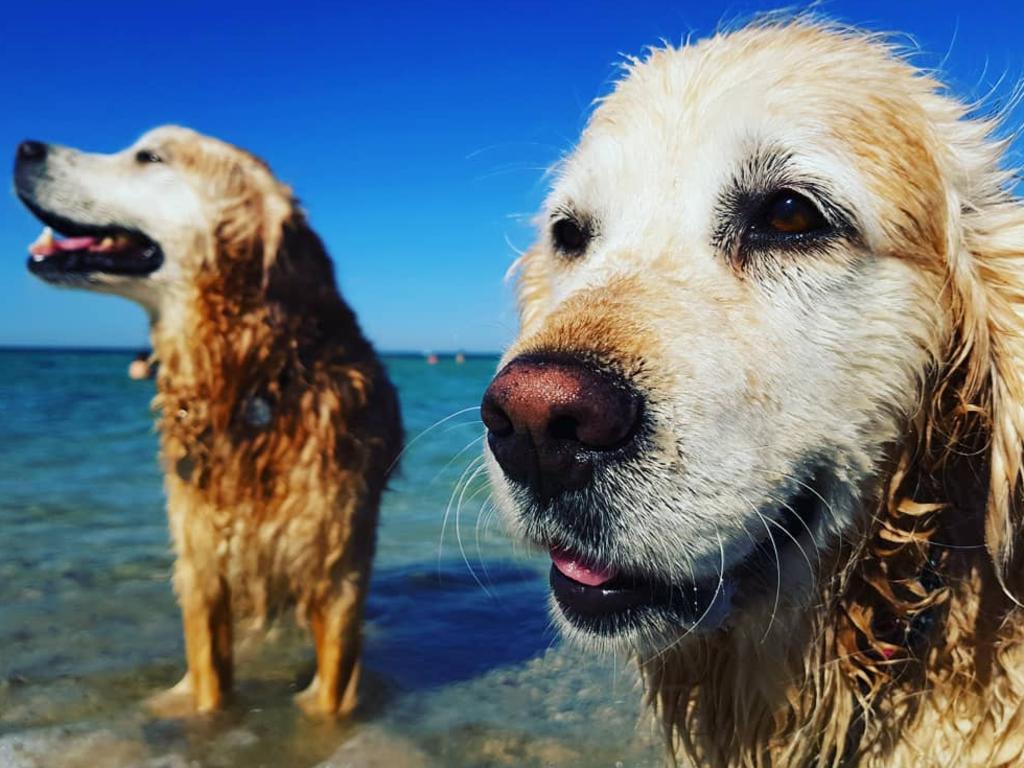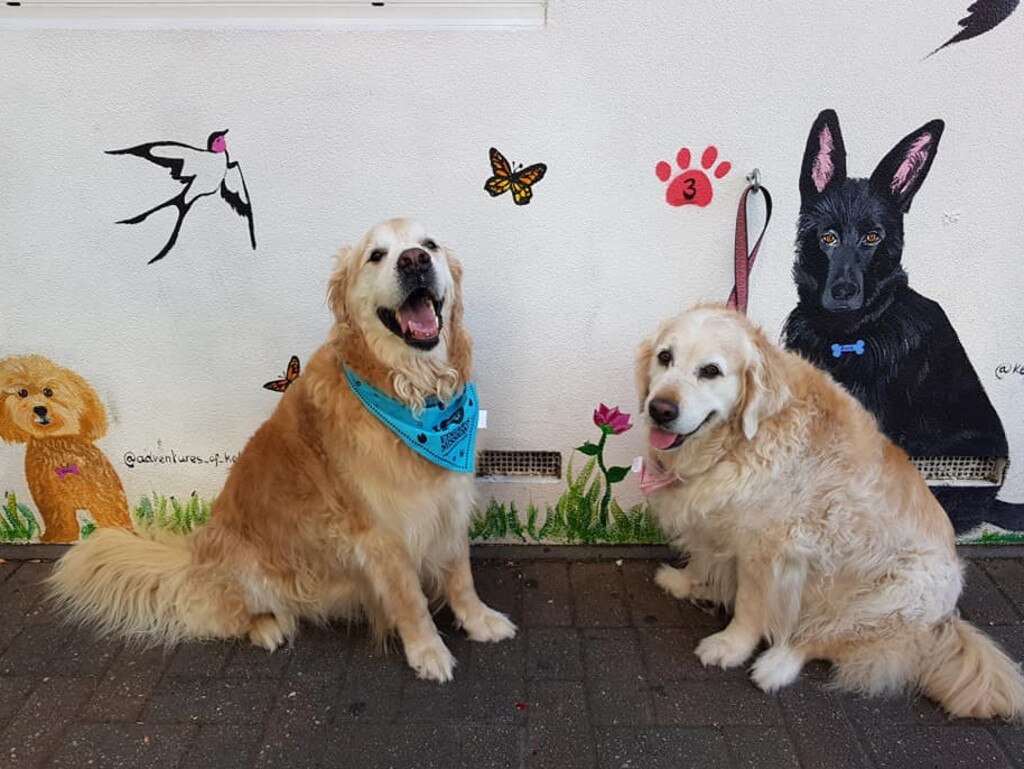‘I’m raising my dogs vegan’
Lea McBride’s dogs exist on textured vegetable protein, beans, lentils, veggies, yeast and apple cider vinegar.
Adelaide woman Lea McBride, 48, is the picture of glowing good health, as are her two senior golden retrievers Darcy, 10, and Emilie, 8. Like Lea, both dogs are strictly vegan, having enjoyed a plant-based diet for almost all of their lives.
“We have raised them as vegan,” says Lea, the director and event co-ordinator at the Vegan Festival Adelaide. “The breeder fed them meat, but we transitioned Darcy to vegan at four months. He was fully vegan by six months. Emilie was 100 per cent vegan by four months — we had already done the research with Darcy, (so) it was much easier.”

Looking at the healthy, energetic senior dogs, it begs the question — could every dog survive — or indeed thrive, on a vegan diet?
IT’S A YES FROM THE VET
When changing her dogs’ diet, Lea worked closely with vet Dr Derek McNair from The Parade Norwood Veterinary Clinic in South Australia to ensure every nutritional requirement was covered.
“At the time, there wasn’t much documentation about pets being raised vegan,” she reveals. “We did as much research as possible, and Dr Derek made us promise we would return to a meat diet if their health suffered even slightly.”
Dr Derek admits to being sceptical at first, but 10 years on, he finds himself constantly in awe of the dogs’ great health.
“I have been caring for them since they were puppies,” he says. “They’re extremely healthy and haven’t ever presented with a problem. They exercise a lot and enjoy good energy levels.
“Lea feeds them commercially-made dry food that the companies claim is balanced. She also goes the extra mile, giving them homemade food and rotating their meals, adding supplements like LSA for Omega-3s and yeast for vitamin B12. She includes soy products, which provide vegetable protein, as well as fatty acids for a shiny coat, good skin and healthy nervous system.”

IT’S A MAYBE-NOT FROM NUTRITIONISTS
Brisbane pet nutritionist Ruth Hatten believes some dogs can safely eat a vegan diet but stresses extra care is needed for the dog to thrive.
“It’s about nutrient bioavailability,” she says. “Dogs are carnivores and current research shows that the nutrients found in animal sources are more bioavailable to them.
“You can increase bioavailability by feeding a wide variety of plant proteins, but the food must be provided in a way that the dog will absorb all of the nutrients.
“Dogs lack amylase in their saliva, an enzyme necessary for processing carbohydrates. They don’t produce cellulase either, which is essential for digesting plants. This means they will have difficulty digesting plants unless measures are taken to assist with digestion.”
With this in mind, all plant matter should be given to dogs in a partially digested state cooked, pulverised and/or mashed. Ruth also recommends a digestive enzyme supplement containing amylase and cellulase. Likewise, apple cider vinegar can help.

While plant-based proteins can provide dogs with sufficient building blocks, essential nutrients Co-enzyme Q10 and vitamin B12 are only available in meat and must be replaced daily.
“Other nutrients include essential fatty acids, vitamins and minerals, which are found in plant foods,” says Ruth, “however I still encourage including raw meaty bones, raw free-range eggs and fish. While not vegan, it allows reduction of meat while significantly reducing any health concerns that may arise from a vegan diet.
“I understand it can be challenging for vegans to feed their dog meat, but I believe that our primary obligation is to the animals in our care. Sometimes a dog won’t enjoy a vegan diet, and that is an important factor, too. If it becomes too hard then a person might choose a pet that doesn’t eat meat, like a rabbit, guinea pig, chicken or horse.
“Another option is to feed the most ethically-sourced meat available, which can be found at your local organic butcher. This will provide additional health benefits to your pet over factory-farmed meat.”
MAKING THE TRANSITION
If you’re set on raising your dog as vegan, the experts stress to do it slowly and, of course, include all of the nutrients mentioned above.
“Take at least a month,” advises Dr Derek, “to allow time for gut bacteria to adjust.”
Lea advises gradually substituting meat for vegan options every meal.
“I started adding vegan dog products to their meat and alternated brands for variety,” she says. “Eventually, we phased out meat entirely and rotated their plant-based meals with supplements to create a holistically nutrient-appropriate diet for them.”


While Lea relies on some store-bought vegan foods, she also prepares homemade meals several times each week.
“I make a batch of wet food using textured vegetable protein with different beans, lentils, vegetables, nutritional yeast and apple cider vinegar. We alternate vegetables for different flavours using sweet potatoes, kale, spinach, and carrots,” she says.
DON’T FORGET REGULAR HEALTH CHECKS
“If your dog is just starting a vegan diet, have them checked every six months,” suggests Dr Derek. “After about two years, if everything is looking good with blood tests and so on, stretch it out to annually, which is what we recommend for every dog, regardless of diet.”

As for Darcy and Emilie, their recent annual check-up delivered a clean bill of health.
“Someone is always having a go at me, but the proof is in my dogs,” laughs Lea of the criticism. “I can’t imagine any reason I would ever change back to meat eating. Their hearing is fine, they are getting up fine, their eyes are fine and they are still very active.
“I’ll admit being a bit nervous when we go to the vet. I do fear people will judge me if anything is wrong. However, this year we have another report of two very healthy dogs.
“I would say to anyone curious about this, do consider it, but as with any dietary change, research and be careful! At 10 and eight, Darcy and Emilie are happy, healthy, clever and so well socialised, but I do put in a great deal of effort to make sure they stay this way.”



